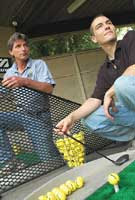Angels Among Us: The Classroom Law Project
from Metro Parent Magazine, July 2009
The Classroom Law Project: Educating Tomorrow’s Leaders Today
Tall and raw-boned, Peter Vaughn runs his blended fourth/fifth grade classroom with the discipline and passion of a football coach exhorting his players to victory. But his goal isn’t making the Super Bowl. It’s making super citizens.
Vaughn teaches at Ockley Green School, a kindergarten-through-eighth grade school in North Portland. The 30-plus students in his blended class are studying the foundations of the United States government. They are attentive and love to participate. “Who had the right to vote in the colonies?” he asks his students. Hands shoot into the air. He points to a student who says, “White men!” “That’s right!” Vaughn says. He smiles broadly. They’re getting it!

Vaughn counts himself among the ranks of an educational elite in Oregon: teachers who have adopted one or more of the programs offered by the Classroom Law Project. Founded 25 years ago in Portland, Classroom Law Project is dedicated to creating better U.S. citizens by engaging students from kindergarten through 12th grade in civic education. As the Project’s website states, “The best way to preserve democracy is to teach democracy. And the best way to teach democracy is to incorporate the lessons and principles of democracy into the school curriculum.” (Visit the site at www.classroomlaw.org.)
“Civics,” as most adults may know it, was once a required course in nearly every high school in America. But sometime in the late 1960s, the study of the U.S. Constitution, citizens’ rights, democracy and the basic concepts of life, liberty and the pursuit of happiness fell out of favor.
“Students were learning about the history of other cultures and nations, but very little about how our form of government came about and how it works,” says Marilyn Cover, the executive director and founder of Classroom Law Project. Cover relocated to Portland from Ohio in the early 1970s. As a lawyer, she was concerned that so many high school graduates had almost no understanding of the Constitution, of what it meant to be a U.S. citizen. She decided to do something about it.
In 1984, she and several other Portland attorneys launched the Classroom Law Project. Their goal: to revive civics as a vital part of a student’s education. The nonprofit’s first program was Court Tours and Mock Trial. Over time, Classroom Law Project gathered momentum. With the support of educators and attorneys, Classroom Law Project was able to offer more programs. Today, it serves 15,000 students at schools throughout Oregon.
Its centerpiece programs are the We The People and Mock Trials competitions. These signature national programs attract a combined 5,000 Oregon middle and high school students annually. Winners of regional and state competitions get to test their knowledge of our government in national competition.
But the organization offers a much broader menu of programs designed to engage students—and their teachers—in our political and legal systems work. Among them: Law Day: an annual conference where students from Oregon and Southwest Washington meet to debate and discuss current legal and political issues. Youth Summit: students attend workshops to prepare for a day-long dialogue on a legal or election issue.
Street Law: Law students from Lewis & Clark Law School visit classrooms to teach practical law in local high schools. Project Citizen: students (mostly middle schoolers) study a specific topic during the year and make a presentation to a panel of outside experts.
A group of Ockley Green students participates in another Classroom Law offering, Law Camp. While other kids are at soccer camp, 20 O-G middle schoolers spend a week at Lewis & Clark Law School, studying real legal cases with law students. “I love Classroom Law Project, especially because of the way it engages the students,” says Vaughn. “Students are challenged, and then you see them rise to the occasion.”
Cover and her staff of three say they are anxious to get more teachers and students involved in Classroom Law Project’s civic-minded work. The organization just received a grant from the Oregon Community Foundation to support a more aggressive marketing effort, and Cover is determined to expand Classroom Law’s influence.
“We need to be in every school in Oregon, if we are going to fulfill our mission of creating active, thoughtful citizens by teaching democracy to students,” she says. And with a new era unfolding in the nation’s capital, the timing seems perfect for Classroom Law Project’s message of turning students into model citizens.














